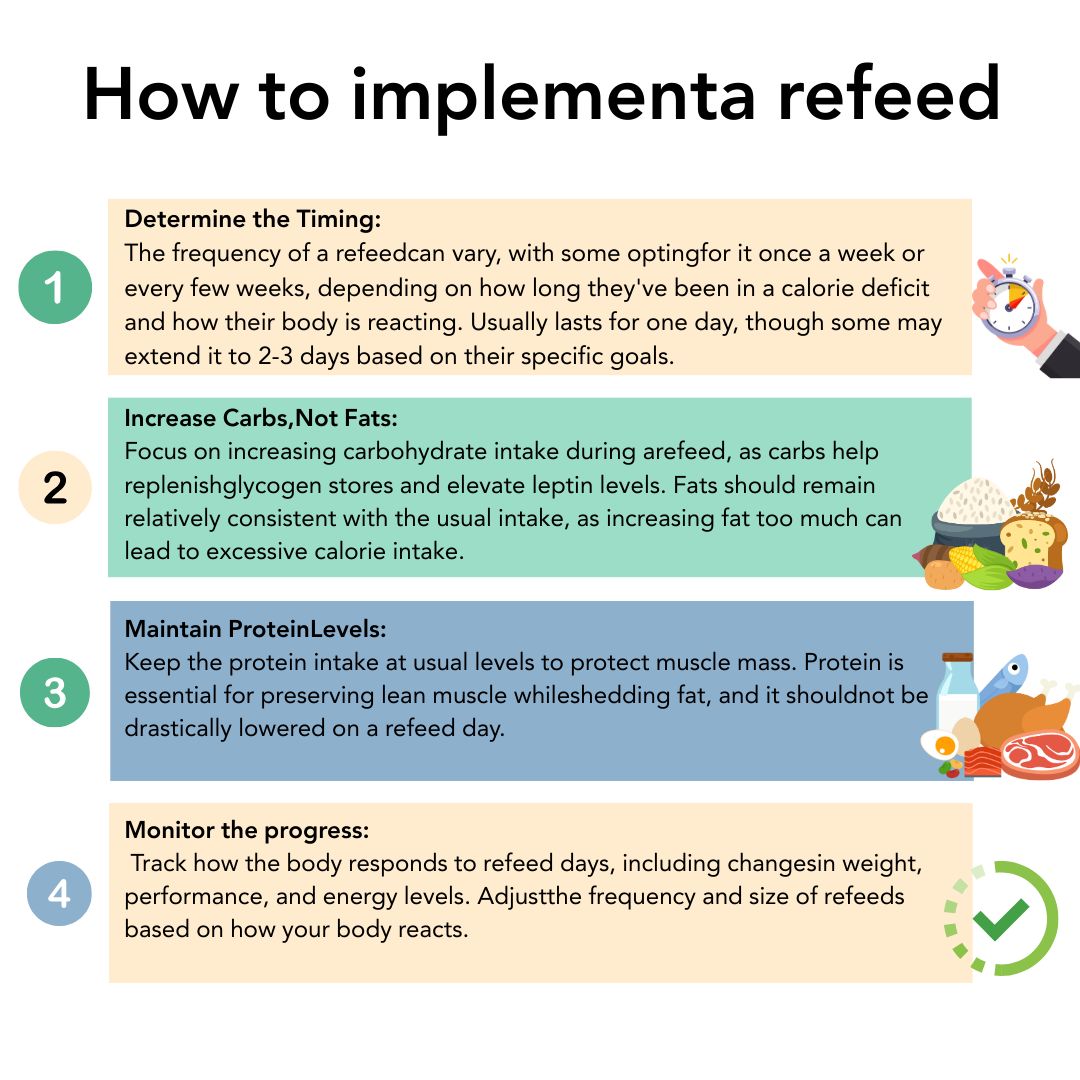Articles

Diet Refeed
What is a Refeed System?
A refeed system is a strategy where an individual temporarily increases their caloric intake by consuming more carbohydrates to meet the body's energy requirements needed to maintain weight. Typically, this involves increasing calories by 5–10% above the usual intake. This approach is commonly used during periods of fat loss or weight maintenance to avoid a drop in metabolic rate, prevent muscle loss, and replenish glycogen stores in the muscles. Additionally, refeeding aims to enhance athletic performance, improve metabolism, and support hormonal balance.
What is the Science Behind Refeed Days?
Refeed days are based on various physiological and hormonal changes designed to promote fat loss while minimizing the negative effects of long-term caloric restriction.
Hormonal Responses to Fat Loss and Energy Restriction
During periods of calorie restriction aimed at fat loss, several hormonal responses occur. Specifically, hormones such as leptin, insulin, growth factors, thyroid hormones, ghrelin, testosterone, and cortisol are all affected.
Research shows that decreased fat mass and energy restriction lead to reduced levels of thyroid hormones, leptin, insulin sensitivity, and testosterone. Conversely, levels of ghrelin and cortisol increase during energy restriction.
-
Leptin is the hormone responsible for signaling satiety and plays a major role in appetite control and fat loss. However, long-term calorie restriction can lower leptin levels, slow metabolism, and encourage fat storage. Refeed periods have been shown to temporarily raise leptin levels, boost metabolic rate, and improve the negative metabolic effects.
-
Thyroid Hormones: Long-term dieting can lower thyroid hormone levels, especially T3, which slows down metabolism. Refeeding can temporarily enhance thyroid hormone production, helping to reduce this metabolic slowdown.
-
Insulin: Insulin sensitivity is crucial for effective fat loss. When insulin sensitivity is high, the body can use carbohydrates for energy more efficiently instead of storing them as fat. Long-term calorie restriction may reduce insulin sensitivity. Refeed days—especially those high in carbohydrates—can temporarily improve insulin sensitivity, aiding better nutrient partitioning and continued fat loss.
-
Ghrelin, often called the “hunger hormone,” stimulates appetite and increases food intake. Elevated ghrelin levels can lead to overeating and make it harder to maintain a calorie deficit.
-
Cortisol, a hormone released in response to stress, can increase during physical, emotional, or psychological stress. High cortisol levels encourage fat storage around the abdomen and increase muscle breakdown, slowing metabolism and increasing cravings for high-calorie foods.
Glycogen Replenishment
After prolonged calorie restriction—especially with low-carb diets—glycogen stores (carbohydrate reserves in the muscles and liver) become depleted. Glycogen is essential for high-intensity training and muscle endurance. When glycogen is low, exercise performance may suffer.
Refeed days help restore glycogen levels, providing more energy during workouts. This is beneficial for maintaining muscle mass and improving strength—both crucial during dieting.
Refeed Days vs. Cheat Meals
Refeed days and cheat meals are different. While both provide a break from dieting, cheat meals allow individuals to eat whatever they want in unmeasured amounts before returning to their routine. In contrast, refeed days involve a controlled increase in calories for one or more days.
Cheat meals can often undo the calorie deficit, whereas refeed days are designed to allow a metabolic break without fat gain.
Who Should Use Refeed Days?
Refeed days are suitable for anyone following a calorie deficit for weight loss, including athletes or bodybuilders in a cutting phase or preparing for a show, and individuals trying to lose weight for health reasons—especially if progress stalls.
A refeed day involves a temporary increase in calories, usually from carbohydrates, to restore glycogen levels and reset hormones like leptin, which decline during calorie restriction. These days are typically planned and regulated to support long-term progress and require ongoing monitoring.
- References:
- https://blog.nasm.org/refeeding-101
- https://cleanhealth.edu.au/blog/wellness/refeeds-vs-diet-breaks/
- https://pmc.ncbi.nlm.nih.gov/articles/PMC7739314/pdf/jfmk-05-00019.pdf
- https://pubmed.ncbi.nlm.nih.gov/19664301/
- https://pubmed.ncbi.nlm.nih.gov/24692351/
- https://pubmed.ncbi.nlm.nih.gov/8897387/
- https://journals.lww.com/acsmmsse/fulltext/1996/10000/effect_of_weight_loss_a nd_refeeding_diet.13.aspx
- https://academic.oup.com/nutritionreviews/article-abstract/73/10/661/1849182


